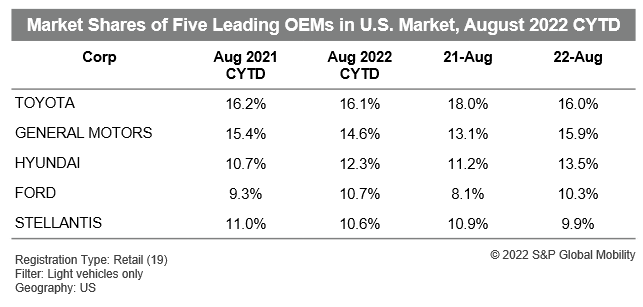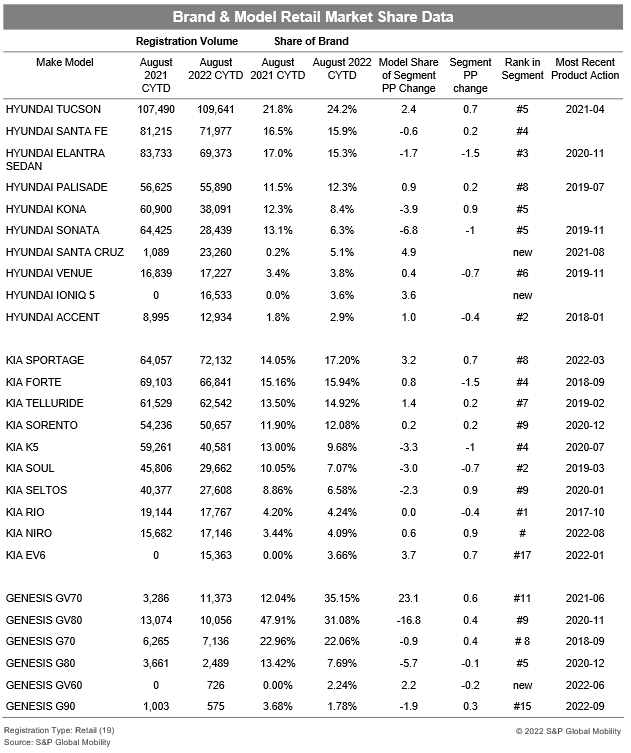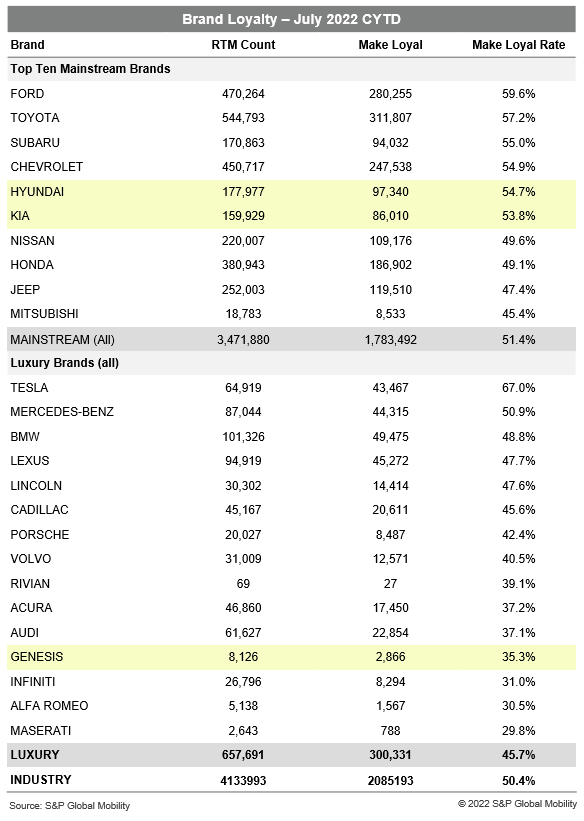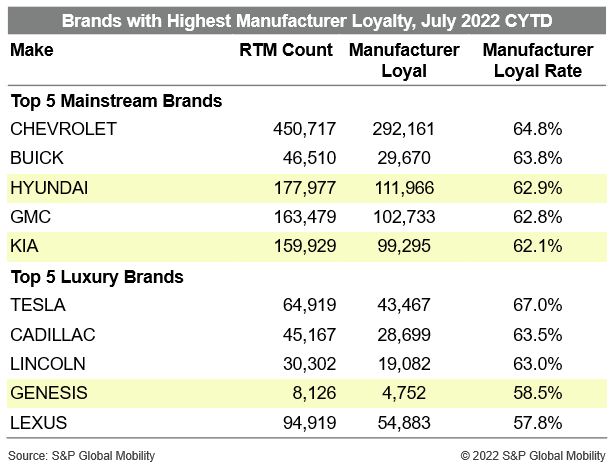Hyundai Motor Team not too long ago has emerged as a single of the
leading-doing new motor vehicle brands in the US. New-car or truck
registration information from S&P Worldwide Mobility through the 1st
8 months of this 12 months (see desk beneath) reveal Hyundai Motor
now ranks as the No. 3 OEM in the US, primarily based on retail corporate
industry share. The mixed Hyundai, Kia, and Genesis manufacturers now
surpass perennial powerhouses Ford Motor Firm, Stellantis Corp.,
and American Honda Motor Co., Inc.

Hyundai Motor’s overall performance has been pushed by (at least) three
strengths, which includes the freshness and timeliness of its a few U.S.
product or service portfolios, the robust brand name loyalties of Kia and Hyundai
house owners, and substantial producer loyalty throughout all a few brands.
Product or service Portfolios
As illustrated in the desk below, each Hyundai-branded
in-industry model other than the discontinued Accent has been possibly
introduced or re-built given that mid-2019. Similarly, each individual Kia product
other than Rio and Forte has been introduced or re-created considering the fact that early
2019. Genesis’s portfolio is similarly clean, with just the G70
languishing in its existing type considering the fact that the finish of 2018. (As cars and trucks,
Accent, Rio, Forte, and G70 compete in a a great deal more compact – and
declining – aspect of the sector when in comparison to crossovers.)
Just as important as the freshness of Hyundai Motor’s product
choices, although, is the relevance of its products. Each the
Hyundai and Kia brands provide entries in each and every a single of the core CUV
segments, from three-row midsize utility down to sub-compact
utility (neither Hyundai nor Kia participates in the entire size
utility segment, but this category accounts for just 2.3% of the
retail market August 2022 CYTD). Finally, the a few-row Palisade and
Telluride crossovers, released in the 2020 product calendar year, for the
1st time offer major competitiveness in one particular of the biggest
segments, and the two products and solutions have currently gained freshenings in
2022.
Genesis, introduced in August 2016, nonetheless lags main luxury brands
in the breadth of its portfolio, and originally was hampered by an
all-car or truck lineup, but it now features 3 crossovers in the heart of
the luxury market.
And finally, Hyundai Motor has demonstrated its competitiveness by
its fast entry into the US EV current market. With the Hyundai Ioniq 5
start final December and the Kia EV6 arrival two months later on, the
company now presents two aggressive EVs, a lot more than many of
its much larger competitors. On top of that, the Ioniq 5 and EV6 now rank
#6 and #7, respectively, amid all EVs (primarily based on August 2022 CYTD
retail registrations) if the 4 Teslas are taken off, the Hyundai
Motor Group goods rank second and 3rd, trailing only the
Mustang Mach-E.

Brand Loyalty
Hyundai Motor’s spectacular retail share partly will come from the two
Hyundai’s and Kia’s ability to retain current owners. As proven
under, these two brands currently rank No. 5 and No. 6 between the 19
mainstream brands in model loyalty. Hyundai Motor is the only
maker to area two makes in the major 10 on this metric.
Each manufacturers have retained such higher percentages of their proprietors
even with not presenting any complete-dimension pickups, midsize pickups, or,
till not long ago, any compact pickups (these 3 pickup segments
account for 17% of the retail marketplace (August 2022 CYTD).
Genesis’ model loyalty has not been as considerable as that of
its stablemates, but element of that is because of to the brand’s newness to
market place. With 7-month model loyalty of 35.3%, Genesis ranks No.
12 between the fifteen luxurious brands for which we have ample
knowledge. Till just lately Genesis loyalty was curtailed by a lack of
crossovers, but the latest additions of the GV60, GV70, and GV80
ought to increase Genesis owners’ probability of buying another
a person.

Company Loyalty
S&P Worldwide Mobility registration facts point out that all
three Hyundai Motor brand names have a single metric doing the job in their favor:
even when house owners defect from any of these models, they have a
potent propensity to stay within just the Group. As illustrated below,
the Hyundai and Kia brands rank #3 and #5, respectively, between all
19 mainstream brands based mostly on their probability to stay faithful to
the company – surpassed only by a few GM brands. And, Genesis
ranks No. 4 in the luxury space on this metric, trailing only
Tesla, Cadillac and Lincoln.

While the 3 Hyundai Group brands have created great
progress, it is noteworthy that the Group continue to lacks that
“stand-out” class leader that gets a house name, a la
Camry, Accord, F Sequence. However, the Team has grown from a
second- or third-tier player ten decades ago into a top OEM dependent on
a number of vital metrics, a feat deserving a whole lot of praise in an
market with around 20 OEMs, 40 brand names and 3 hundred models.
—————————————————————————————–
This automotive perception is element of our monthly Best
10 Trends Field Report.The Report findings are
taken from new and utilized registration and loyalty data.
The September report is now available, incorporating July 2022
CFI and LAT facts. To down load the report, be sure to click down below.
Obtain REPORT



This report was posted by S&P World Mobility and not by S&P Global Scores, which is a individually managed division of S&P World-wide.






More Stories
2022 Ford Bronco Raptor Unsurprisingly Thirsty at 15 MPG Combined
How to fix your sagging headliner
The Best 90’s Cars You Can Buy Today